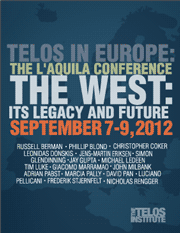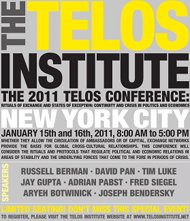By Julio Alcántara · Wednesday, February 27, 2013 The following paper was presented at Telos in Europe: The L’Aquila Conference, held on September 7-9, 2012, in L’Aquila, Italy.
 When we ask, once again, about the sense and origin of the West, we are led to a spatial relation of meaning that humans have with the world and with themselves. The essence of this act is based on the fundamental values of this era, which define the borderlines of the present’s symbolic extension: the human being, as a spatial-being, is also temporal. In fact, spatial differences are not more that multiple fields of temporal states of being. In short, what brings us together today is the polemic signification of the space-time limit of the occidental man and, as such, of the factual possibility of being in the world. When we ask, once again, about the sense and origin of the West, we are led to a spatial relation of meaning that humans have with the world and with themselves. The essence of this act is based on the fundamental values of this era, which define the borderlines of the present’s symbolic extension: the human being, as a spatial-being, is also temporal. In fact, spatial differences are not more that multiple fields of temporal states of being. In short, what brings us together today is the polemic signification of the space-time limit of the occidental man and, as such, of the factual possibility of being in the world.
Continue reading →
By David Pan · Monday, March 7, 2011 This paper was presented at the 2011 Telos Conference, “Rituals of Exchange and States of Exception: Continuity and Crisis in Politics and Economics.”
 When we consider the metaphysical foundations of our world, we must make a basic choice between a universal conception of metaphysics and a relativist one. This choice commits us to either of two possibilities for world order. With a universalist conception, world order will evolve through a gradual establishment of one universal metaphysical structure that will establish its universality everywhere. With the relativist conception, world order can only consist of a set of agreements and rituals that can be established between a number of separate spaces, each of which is organized according to its own metaphysical structure. The choice for one or the other of these perspectives is consequently a fundamental one that will have far-reaching consequences for our conception of politics in a global context. When we consider the metaphysical foundations of our world, we must make a basic choice between a universal conception of metaphysics and a relativist one. This choice commits us to either of two possibilities for world order. With a universalist conception, world order will evolve through a gradual establishment of one universal metaphysical structure that will establish its universality everywhere. With the relativist conception, world order can only consist of a set of agreements and rituals that can be established between a number of separate spaces, each of which is organized according to its own metaphysical structure. The choice for one or the other of these perspectives is consequently a fundamental one that will have far-reaching consequences for our conception of politics in a global context.
Continue reading →
|
|
 When we ask, once again, about the sense and origin of the West, we are led to a spatial relation of meaning that humans have with the world and with themselves. The essence of this act is based on the fundamental values of this era, which define the borderlines of the present’s symbolic extension: the human being, as a spatial-being, is also temporal. In fact, spatial differences are not more that multiple fields of temporal states of being. In short, what brings us together today is the polemic signification of the space-time limit of the occidental man and, as such, of the factual possibility of being in the world.
When we ask, once again, about the sense and origin of the West, we are led to a spatial relation of meaning that humans have with the world and with themselves. The essence of this act is based on the fundamental values of this era, which define the borderlines of the present’s symbolic extension: the human being, as a spatial-being, is also temporal. In fact, spatial differences are not more that multiple fields of temporal states of being. In short, what brings us together today is the polemic signification of the space-time limit of the occidental man and, as such, of the factual possibility of being in the world.  When we consider the metaphysical foundations of our world, we must make a basic choice between a universal conception of metaphysics and a relativist one. This choice commits us to either of two possibilities for world order. With a universalist conception, world order will evolve through a gradual establishment of one universal metaphysical structure that will establish its universality everywhere. With the relativist conception, world order can only consist of a set of agreements and rituals that can be established between a number of separate spaces, each of which is organized according to its own metaphysical structure. The choice for one or the other of these perspectives is consequently a fundamental one that will have far-reaching consequences for our conception of politics in a global context.
When we consider the metaphysical foundations of our world, we must make a basic choice between a universal conception of metaphysics and a relativist one. This choice commits us to either of two possibilities for world order. With a universalist conception, world order will evolve through a gradual establishment of one universal metaphysical structure that will establish its universality everywhere. With the relativist conception, world order can only consist of a set of agreements and rituals that can be established between a number of separate spaces, each of which is organized according to its own metaphysical structure. The choice for one or the other of these perspectives is consequently a fundamental one that will have far-reaching consequences for our conception of politics in a global context. 

